八年级英语下册Unit3AnimalsAreOurFriendsLesson15TheZooIsOpen教案新版冀教版word版本
- 格式:doc
- 大小:22.50 KB
- 文档页数:4
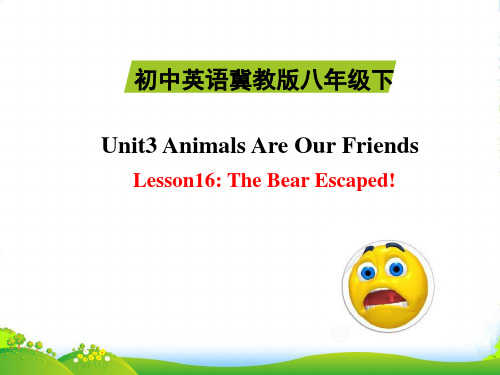

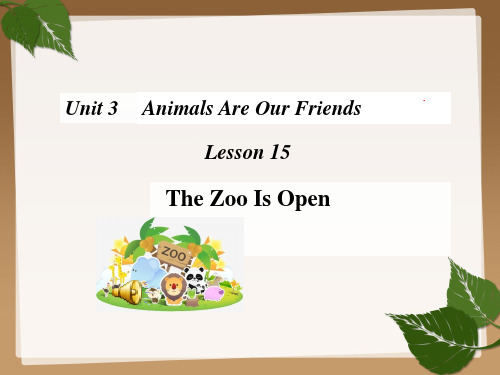
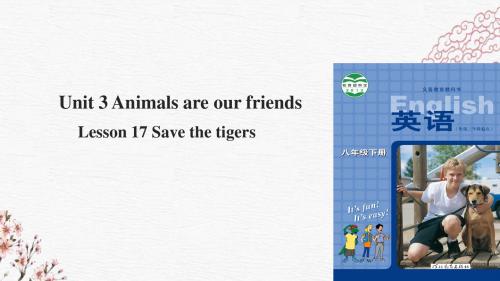
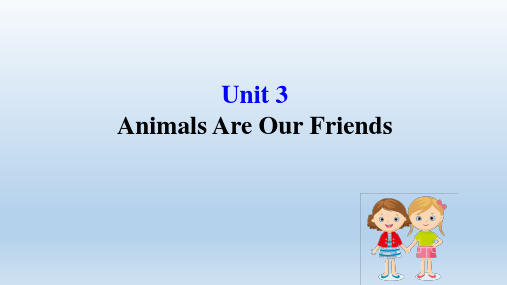
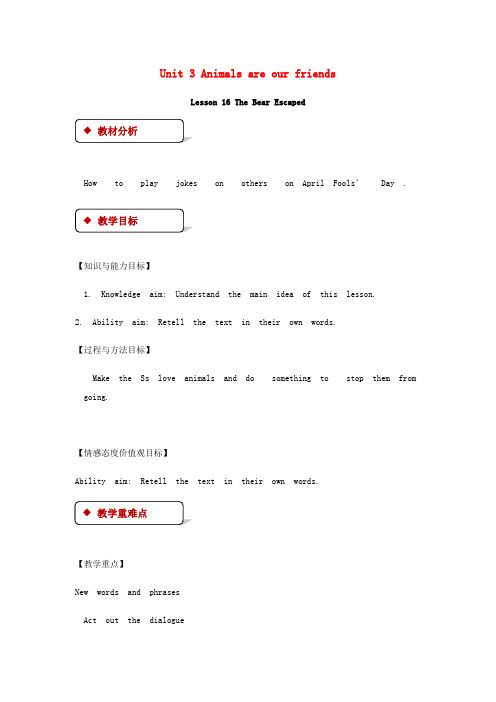
Unit 3 Animals are our friends Lesson 16 The Bear EscapedHow toplay jokes on otherson April Fools’Day .【知识与能力目标】1. Knowledge aim: Understand the main idea of this lesson.2. Ability aim: Retell the text in their own words.【过程与方法目标】Make the Ss love animals and do something to stop them from going.【情感态度价值观目标】Ability aim: Retell the text in their own words.【教学重点】New words and phrasesAct out the dialogue【教学难点】How to play jokes on others on April Fools’Day. Language points图片,PPTStep 1.Analysis of the student.Homework check.Review: Ask some Ss to talk about the animals in the zoo, and what did we learn in last lesson?Review the grammar: Indefinite Pronouns (some,any)Step 2. Lead in.(引入)1.Greet the students in English and make sure they can response correctly.Do the duty report: a student on duty can say whatever he/she likes to say.e to “Think About It!”What do you know about April Fools’ Day?Have you ever played a trick on a friend? What did you do?T:Introduce the April Fools’ Day, and tell the Ss what they can do on that day. Then we will learn the text about Danny’s activity on that day.22Step 3. New lesson.(新课)No. 1 Prepare lessons before class.Teach the new words and phrases. Make sure the Ss can read it correctly.No. 2 Text: Give them some time to read the text themselves. Then let them act out the dialogue in groups. Correct their pronunciation when necessary.At last, the teacher explains the text in Chinese, make sure the Ss can understand the meaning of text.No.3Important phrases:Danny jumps up and down.Wait a minute. Get out ofYou’re joking, aren’t you?Play a trick/joke......on sb.No. 4 Culture Tip:April Fools’ Day is the first day of Apr il. In most Western countries, people like to play jokes on each other. When you play a joke on somebody, you laugh and they laugh,too.But don’t play jokes that make other people sad or mad. April Fools’ Day is meant to be fun for everyone.No. 5 Finish “Let’s Do It!”Step 4. Play the tape for the Ss to follow.Make the Ss listen the text, then let them read follow the tape.Step 5.Summary. (小结)3Sum up the text what we learned, the new words, phrases, and sentences. Sum up the grammar.Step 6. Homework.(作业)Finish the activity book and the practice.Copy the new words and phrases twice.Step 7.Blackboard-writing:(板书)The new words, the master phrases, important sentences.The grammar and practice.略。
Unit 3 Animals are our friendsLesson 17 Save the tigers本单元围绕动物和动物保护这一话题展开教学。
课本先从Danny和Jenny的对话开始让学生了解养宠物的情况,接着详细介绍了令人吃惊的动物、动物园的情况、拯救动物和动物之间的友谊。
本课为第三单元第五课,主题是保护动物,这是《义务教育课程标准2011年版》的主要话题之一。
教材围绕谈论有关保护老虎的情况,引出了本课的教学重点volunteer, important, danger, disappear, wild等与保护动物有关的词汇,以及常用于介绍保护动物的句式如:For this reason, tigers are important to the environment.教学内容与学生的实际生活密切相关,又是现代社会急需解决的问题。
本课对整个单元起到了升华的作用。
授课中可用到一些实际而又形象的视频辅助教学。
【知识与能力目标】通过本课的学习,约85%的学生能够熟悉单词和短语volunteer, important, danger, disappear, wild, at the beginning of, drop to, food chain, in danger ;(2)约80%的学生讲能够使用简单的英语句子介绍如何保护动物并做简单的报告。
【过程与方法目标】课上让学生通过小组合作的形式相互交流,在此基础上,教师通过幻灯片、图片向学生展示一些不同的动物保护行动,90%的学生可以做简单介绍。
【情感态度价值观目标】通过活动提高学生学习英语的兴趣,并借此话题激发学生保护动物的意识从此付诸行动。
【教学重点】掌握一些与保护动物有关的词汇并了解保护动物的方法。
掌握一些介绍保护动物的句式并会做简单的报告。
【教学难点】动词不定式的用法。
图片,PPTStep 1.Analysis of the student.(学生分析)Homework check.Review: In last lesson, we played a joke on Danny, then we learned about one animal—bear, and we know that the bear is fierce. we also learned about April Fool’s Day.Step 2. Lead in.(引入)1.Greet the students in English and make sure they can response correctly.Do the duty report: a student on duty can say whatever he/she likes to say.22e to "THINK ABOUT IT".Where can you usually see a tiger?Do you know tigers need our help? Why or why not?Step 3. New lesson.(新课)No. 1 Prepare lessons before class.Teach the new words and phrases. Make sure the Ss can read it correctly.No. 2 Text:Give them some time to read the text themselves. Then let them act out the dialogue in groups. Correct their pronunciation when necessary.At last, the teacher explains the text in Chinese, make sure the Ss can understand the meaning of text.No. 3Important phrases:At the beginning of the 20th century,In recent years, tigers have been in danger of disappearing.No. 4Learning Tip:There are currently six types of tigers: the Bengal tiger, the Siberian tiger, the Sumatran tiger, the Malayan tiger, the Indochinese tiger and the South China tiger. No. 5 Finish “Let’s Do It!”Step 4. Play the tape for the Ss to follow.Make the Ss listen the text, then let them read follow the tape.Step 5.Summary. (小结)Sum up the text what we learned, the new words, phrases, and sentences.Sum up the grammar.3Step 6. Homework.(作业)Finish the activity book and the practice.Copy the new words and phrases twice.Step 7.Blackboard-writing:(板书)The new words, the master phrases, important sentences. The grammar and practice.略。
Lesson13 Danny’s Big Scared知识点集结与练习1. scare n v 惊吓Scared adj 害怕的scary adj 吓人的,可怕的be scared of=be afraid of害怕…2.tiny adj微小的,带有感情色彩,强调物体的个头或体积很小Small 小的,不大的,侧重尺寸数量规模Little 小的,小巧的,常有喜爱或称赞的意味3.vocation n 假期,休假去度假go on a vocation = on a holiday4..一路上,自始至终all the way5.尽力做某事try to do尝试做某事try doing尽最大努力做某事try one’s best to do6.跳离jump off7.要求/请某人做某事ask sb to do8.友好而忠诚的friendly and loyal9.be afraid of+名词/代词/动名词害怕…be afraid to do不敢做某事10.He hasn’t been to the zoo in Edmonton yet.have/has been to去过某地(现在人已经回来),可与once,twice等连用have/has gone to去了某地,强调说话时人不在现场have/has been in/at在某地多长时间了,与时间段连用yet 副词,译为“还”,通常用于否定句或疑问句,置于句末,用于现在完成时的句子中。
already 常用于肯定句,表示“已经”。
11.I think he will be glad to go.be glad to do =be happy to do做某事很高兴be+ adj +to do sth 做某事是…的12.Protect yourself.Protect v 保护—protection n 保护Protect sb from保护…免受…,使…免于练习一. 词语填空1.度假__________2.害怕__________3.进来__________4.在家__________5.坐下__________6.一路上 __________7.去过某地__________ 8.高兴做某事__________9.从…跳下__________ 10.尽力做某事__________二单选1.Julie’s father ________ to London last month.He ________ there three times.A.went;had gone B.has gone;has beenC.went;has been D.has been;had gone2. You should ask Bob _______ his own clothes. He is ten years old now.A.wash B.washes C.washing D.to wash 3.She often ________ new words in the dictionary. It's a good habit.A.looks after B.looks downC.looks up D.looks out4.I'll try ________ the job as soon as possible.A.to finish B.finishC.not finish D.to finishing5.She looked sad.There must be something bad happened ____ her.A.to B.with C.of D.about6.This shirt is made of silk.Please wash it ________.A.gentle B.gently C.hardly D.careful三填空1.Don’t be ________________(害怕的) of pandas.They are very shy and friendly.2.The cat is very ___________(温和的).3.My parents asked me _______(not play)on the street.4.We were all ________(surprise) when we heard the _______(surprise) news.5.Are you afraid of ________(fall)into the swimming pool?6.Yesterday Tom made his little sister ______(cry).四阅读It came as a real shock(震惊) to find out that chickens could tell what color they were eating.I picked up a package of mixed greens one day. I anxiously brought it home and immediately took a trip out to the chicken house to deliver(递送) it. I knew the girls would welcome the treat!My chickens have their regular gravity-type feeder for their grain(谷物), and I have a large plastic dog dish that I use for those special treats.I emptied the bag of greens into the dog dish and stood back, as I usually do, to watch for a minute. I began to notice that the chickens were eating the green lettuce(莴苣)but were leaving the red leaves. I though it must be mistaken, but I didn’t have time t o find out for sure right then.When I went back a short time later, the dish was empty except for the red leaves. The chickens didn’t eat them with the red leaves. It took several hours, but they finally did eat it. I guess if they had their druthers(偏爱), they’d choose for green leaves only. Red leaves onlysatisfy in the absence of greens.1.The word “girls”in the second paragraph means “________”A. chickensB. greensC. colors2.What was used to feed the chicken as the special treat?A. A heavy feederB. A big plastic dog dishC. A special plate3.What does the author usually do when feeding the chickens?A. He often watches them eating for a while.B. He usually offers some water for the chicken.C. He often leaves first and then comes back to have a look.4.How did the author feel when he found the chickens could tell the food color?A. Very interestingB. Quite pleasedC. very surprised答案一略二CDCAAB三1.scared /afraid 2. gentle 3.not to play 4. Surprised, surprising 5. Falling 6. Cry四ABAC。
Unit 3 Animals are our friends Lesson 15 The zoo is open
In this lesson, the
students need to grasp the useful words
dange
r and dangerous; 2.The students need to learn how to write travel notes in English.
【知识与能力目标】
In this lesson, I will improve the students’
language ability by practicing and communicating.
【过程与方法目标】
After learning this lesson, the students need to know that
animals are our friends and we should love animals.
【情感态度价值观目标】
How to write travel notes in English.
【教学重点】
Talk about the animals in the zoo.
【教学难点】
After learning this lesson, the students need to know that
animals are our friends and we should love animals.
图片,PPT
Step 1.Analysis of the student.
Homework check.
Review: Ask some Ss to talk about the animals in lesson 14.We learned about some special animals and we knew the difference between the animals and the pets. Step 2. Lead in.(引入)
Greet the students in English and make sure they can response correctly.
Do the duty report: a student on duty can say whatever he/she likes to say. Come to “Think about It!”
What animals do you think are dangerous? Why?
What rules should we obey at the zoo?
Step 3. New lesson.(新课)
No. 1 Prepare lessons before class.
Come to the vocabulary.
Teach the new words and phrases. Make sure the Ss can read it correctly.
No. 2 Text: Give them some time to read the text themselves. Then let them act out the dialogue in groups. Correct their pronunciation when necessary.
At last, the teacher explains the text in Chinese, make sure the Ss can understand the meaning of text.
No. 3 Important phrases:
go to the zoo arrive at go through point to take photos wake up
lots of instead of
No. 4 Project: We’re going to the zoo!
Have you ever visited a zoo? Write a story about trip to the zoo. Don’t forget to answer these questions:
When did you go to the zoo?
Who went to the zoo with you?
What animals did you see?
What animals did you like best? Why?
Did you feed any animals?
Are zoos good for animals? Why or why not?
No. 5 Finish “Let’s Do It!”
Step 4. Play the tape for the Ss to follow.
Make the Ss listen the text, then let them read follow the tape.
Step 5.Summary. (小结)
Sum up the text what we learned, the new words, phrases, and sentences. Sum up the grammar.
Step 6. Homework.(作业)
Finish the activity book and the practice.
Copy the new words and phrases twice.
Step 7.Blackboard-writing:(板书)
The new words, the master phrases, important sentences.
The grammar and practice.
略。